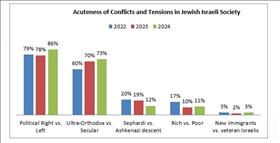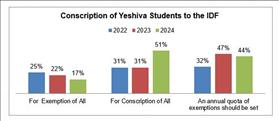Hiddush Annual Religion and State Index 2024
The government is acting against the will of the public in all matters related to religion and state
24/09/2024 15:40
Tags: Hiddush · Religion and State Index

Acuteness of Conflicts and Tensions in Jewish Israeli Society
The 16th annual Religion and State Index was published by Hiddush – Freedom of Religion for Israel, Inc. ahead of the Jewish New Year. The index is the only systematic and in-depth periodic review of the views of the adult Jewish public in Israel on matters of religion and state, providing a comprehensive picture of contentious issues and enable us to track the development of these views while examining them via a range of social, political, and religious breakdowns. The findings of the index demonstrate once again the wide gap between the positions of the majority of the Jewish public on all matters of religion and state and those of the political leadership which claim to faithfully represent their wishes.
Conflicts and Tensions in Israeli Society
73% of the Jewish public in Israel view the tension between Haredim and secular Jews as the most acute internal conflict in Israeli society today [or the second most acute]. The tensions between Haredim and secular Jews and between the political right and left are considered the most significant domestic conflicts by the adult Jewish public in Israel, far more than other internal tensions that have torn Israeli society apart in the past. In recent years, the tension between the political right and left has escalated. Following the attempt at “judicial overhaul” and the events of October 7th, the conduct of key figures in Israeli politics, mainly from within coalition circles, has further exacerbated this conflict. 86% believe it is currently the most severe conflict in Israeli society [61% view it as the most acute, and an additional 25% as the second most acute]. This marks an increase of 8% from last year.
The public’s trust in the Supreme Court is three times more than in the government
Status of Main Streams in Judaism
60% support Israel granting equalstatus tothe three main streams of Judaism in Israel: Orthodox, Conservative and Reform. Among the secular public, 85% support granting equal status, as do the majority of the traditional public.
Trust in State Institutions
Once again, the findings of the index demonstrate that the assault of government circles on the Supreme Court (alleging that the Court has lost the trust of the People while they are the authentic representatives enjoying the public’s trust and expressing their will) are false and demagogic.
The public’s trust in the Supreme Court is three times more than in the government and almost six times greater than in the Knesset.
An examination of public trust in the relevant state institutions (the Supreme Court, the government, and the Knesset) shows that the Supreme Court is actually the institution that enjoys the greatest degree of high trust among the public (31%). Only 11% place have high trust in the government, and only 5% in the Knesset. 13% place a great degree of trust in the Chief Rabbinate. About half of the public (49%) does not trust any of these institutions. This represents an increase of 9% in distrust compared to the previous year.
Conscription of Yeshiva Students to the IDF and Funding for Ultra-Orthodox Parties
The war on the southern and northern fronts has intensified the public discourse regarding equality in bearing the security burden and the conscription of Yeshiva students into the IDF. The annual index shows that 83% of the Jewish public in Israel support either drafting Yeshiva students into the IDF, for a full-length mandatory military service or essential civil service according to the needs of the army] (51%) or setting an annual quota of exemptions for exceptional

Conscription of Yeshiva Students to the IDF
Yeshiva students and drafting the rest into military or civil service (32%). Only 17% [a decrease from 22% last year], mostly from the Haredi community and a minority from the religious community, responded that they accept the ultra-Orthodox position that Yeshiva students, through their engagement in religious study, bring victory to the state and contribute more to the country than the army, and therefore, they should be exempt from the obligation to serve. It should be noted and emphasized that the percentage of those supporting full conscription of Yeshiva students has increased since last year from 31% to 51%, and the percentage of those supporting exemptions for a quota of outstanding yeshiva students has decreased from 47% to 32%.
The Supreme Court has ordered the state to draft Haredim into the IDF and to stop supporting yeshiva students who refuse to enlist. Sanctions such as the denial of additional benefits to those who refuse to serve, i.e., discounts on municipal taxes and subsidies for day-care , as well as further sanctions like revoking driver’s licenses and passports, are under consideration. According to the index survey, 78% support all these measures (57%) or some of them (21%), while only 22% oppose imposing sanctions for religious or social reasons. Support for sanctions is shared by 78% of Likud voters, 65% of Religious Zionism and Otzma Yehudit voters, 96% of the secular public, and a large majority of the traditional and religious public.
The Religion and State Index survey was conducted by telephone by the Smith Institute in the first week of August 2024, based on an expanded sample of 800 people representing the adult Jewish population in Israel, aged 18 and over. The margin of error is ±3.5%.
For additional findings from the Hiddush Religion and State Index 2024, click here